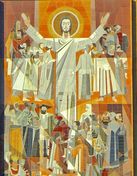Science and Religion Seminar 2015

Science and Religion: Strangers, Rivals, or Partners in the Search for Truth?
The Institute for Church Life at the University of Notre Dame, in collaboration with the Catholic Education Institute in New York, will conduct a one-week summer seminar for Catholic high school teachers of biology, physics, and religion from June 14-19, 2015. Chemistry and math teachers are also encouraged to attend. The seminars are made possible through a generous grant from the John Templeton Foundation with supplemental funding from the Catholic Extension Society.
Who Should Attend?
The Science and Religion Seminar is intended for two groups: (1) teachers of science who have an interest in positively and intelligently relating some of the topics they cover in their regular biology or physics class to religious issues, and (2) teachers of religion who have an interest in speaking knowledgeably in their classes about the intersection between science and religion. Teachers need not be experts in connecting the two ways of knowing, but they must possess the desire to learn how they can be connected and to share some insights gained in the seminar with students in their future classes. Find out more about topics and questions that will be addressed in the seminar.
Rationale
Traditional Catholic teaching holds that there are two “Books of God”: the Book of Nature and Book of Scripture (or revelation), both of which point to and reveal the invisible God who is both transcendent to and immanent in the world. When Pope Benedict XVI said that “there is friendship between science and faith,” and that “scientists can, through their vocation to study nature, follow an authentic and absorbing path of sanctity," he was merely echoing long-held Christian beliefs. St. Paul said “the invisible things of God have been clearly seen by the mind’s understanding of created things” (Romans 1:19). St. Augustine claimed that “the ores of divine providence are everywhere to be found” in the created world. St. Bonaventure held that “the presence of God suffuses creation and readily offers itself to those who study it attentively,” and that “in everything which is perceived or known, God Himself lies hidden within.” Diligent and faithful study enables us to discover those “ores of divine providence.”
In spite of these long-held beliefs, conflicts and misunderstandings during the past four centuries have created a gulf between science and religion. Although there have been many recent attempts to foster dialogue between them and, where possible, to seek their integration into a broader unity, others continue to sow seeds of conflict, e.g., the "new atheists." While acknowledging areas of conflict and the need for respecting separate disciplinary subject matters and methods, the seminar will attend to areas where dialogue between religion and science can be fruitful and where integration is possible.
Seminar Goals
Participants will learn how to incorporate material learned in the seminar into their regular classes in biology, physics, or religion. Moreover, seminar faculty will work closely with teachers who wish to create a new elective course that focuses specifically on the relationship between science and religion.
Seminar Faculty
- Nicanor Austriaco, O.P., Department of Biology, Providence College
- John Braverman, S.J., Department of Biology, St. Joseph’s University
- John Cavadini, Professor of Theology, University of Notre Dame
- Guy Consolmagno, S.J., Vatican Observatory
Daily Schedule
- Individual subject matter track sessions (biology, physics, religion);
- Shared theology and science sessions for all participants;
- Plenary participatory sessions integrating perspectives in philosophy, theology, and science.
Science teachers will learn how theological insights can be used to inform some of the typical topics in biology and physics courses, while religion teachers will learn how scientific findings can help inform and enhance their appreciation of God's creation and means of passing that appreciation on to their students. In addition, all teachers will view a presentation of All Creation Gives Praise in Notre Dame’s Digital Visualization Theatre, in which theological reflections and astrophysical explanations are blended together in a digital journey through the universe. This presentation will be live streamed to online participants (see below).
Two Ways of Participating in the Seminar
As is the case in most seminars, a great deal of what participants learn comes from interaction with other participants. For this seminar we offer two modes of participation.
-
On-campus residential experience at Notre Dame
For this section, Notre Dame seeks a representation of interested Catholic high schools across the nation.
-
Live, on-line participation for those unable to travel to the Notre Dame campus (all sessions will be live-streamed to participants’ home computers)
Chat-rooms and opportunities for on-line pedagogical exchange are the norm. Participants will be able to offer demonstration presentations of how religious themes can be connected, for example, to cellular biology or the basic laws of physical forces.
Seminar Cost
Through the generosity of the Templeton Foundation and the Catholic Extension Society, the seminar is free to Catholic high school teachers. We encourage schools to provide pay equivalent to 5 days of teaching for their participating teachers. Notre Dame will provide housing, meals, and course materials. For high schools from Mission Dioceses without resources for teacher travel and development, Notre Dame will be able to reimburse travel expenses for a limited number of teachers.
Application
For application or the request for more information please use our application page or contact Patricia Bellm in the Institute for Church Life: seminar2015@nd.edu or (574) 631-1379.